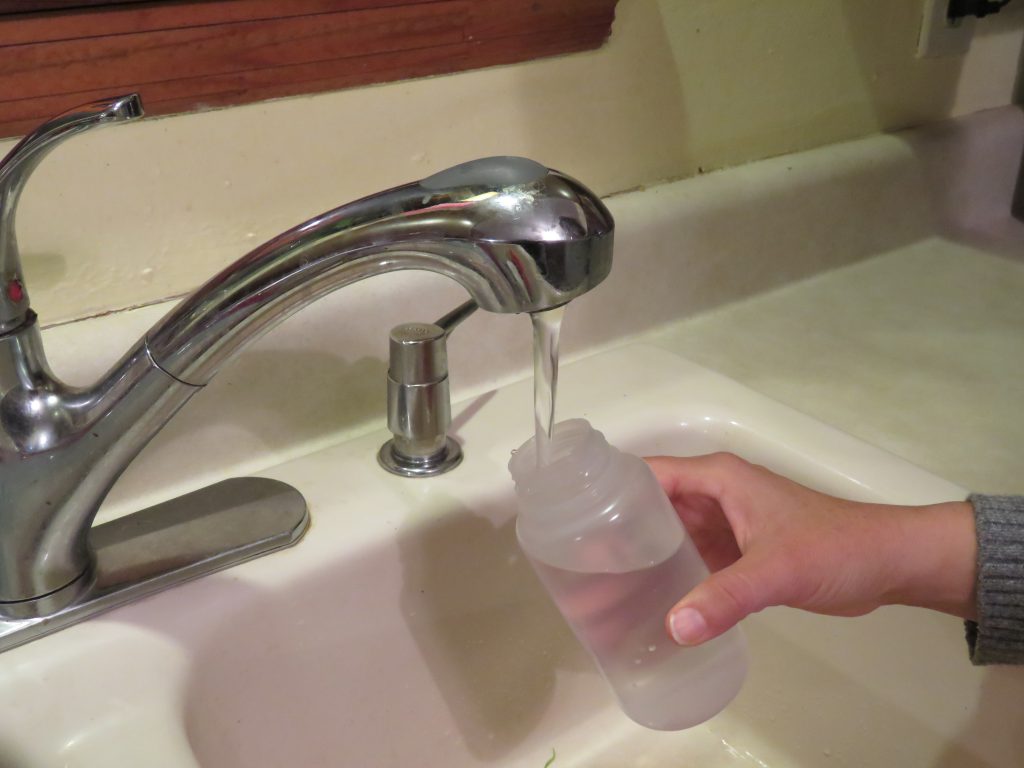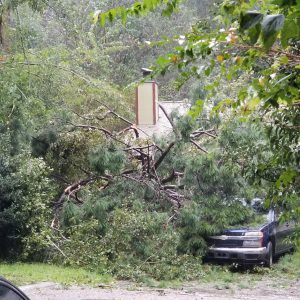
by Andrea Albertin | Oct 1, 2020
If your private well was damaged or flooded due to a hurricane or other heavy storm activity, your well water may not be safe to drink. Well water should not be used for drinking, cooking purposes, making ice, brushing teeth, or bathing until it is tested by a certified laboratory for total coliform bacteria and E. coli.
Residents should use bottled, boiled, or treated water until their well water has been tested and deemed safe.
- Boiling: To make water safe for drinking, cooking, or washing, bring it to a rolling boil for at least one minute to kill organisms and then allow it to cool.
- Disinfecting with bleach: If boiling isn’t possible, add 1/8 teaspoon or about 8 drops of fresh unscented household bleach (4 to 6% active ingredient) per gallon of water. Stir well and let stand for 30 minutes. If the water is cloudy after 30 minutes, repeat the procedure once.
- Keep treated or boiled water in a closed container to prevent contamination.
NOTE: Use bottled water for mixing infant formula.
Where can you have your well water tested?

Contact your county health department for information on how to have your well water tested. Image: F. Alvarado Arce
Most county health departments accept water samples for testing. Contact your local department for information about what to have your water tested for (they may recommend more than just for bacteria), and how to collect and submit the sample.
Contact information for Florida Health Departments can be found here: County Health Departments – Location Finder
You can also submit samples to a certified commercial lab near you. Contact information for commercial laboratories that are certified by the Florida Department of Health are found here: Laboratories certified by FDOH. This site includes county health department labs, commercial labs, and university labs; you can search by county.
What should you do if your well water sample tests positive for bacteria?
The Florida Department of Health recommends well disinfection if water samples test positive for total coliform bacteria or for both total coliform and E. coli, a type of fecal coliform bacteria.
You can hire a local licensed well operator to disinfect your well, or if you feel comfortable, you can shock chlorinate the well yourself.
You can find information on how to shock chlorinate your well at:
After well disinfection, you will need to have your well water re-tested to make sure it is safe to use. If it tests positive again for total coliform bacteria or both total coliform and E. coli, call a licensed well operator to have the well inspected to get to the root of the problem.
Well Pump and Electrical System Care
If the pump and/or electrical system have been underwater and are not designed to be used underwater, do not turn on the pump. There is a potential for electrical shock or damage to the well or pump. Stay away from the well pump while flooded to avoid electrical shock.
Once the floodwaters have receded and the pump and electrical system have dried, a qualified electrician, well operator/driller, or pump installer should check the wiring system and other well components.
Remember: You should have your well water tested any time:
- A flood occurs and your well is affected
- The color, taste, or odor of your well water changes or you suspect that someone became sick after drinking your well water.
- A new well is drilled or you have had maintenance done on your existing well
- There has been any type of chemical spill (pesticides, fuel, etc.) into or near your well
The Florida Department of Health maintains an excellent website with many resources for private well users: FDOH Private Well Testing and Other Resources includes information on potential contaminants and how to maintain your well to ensure the quality of your well water.
by Samantha Kennedy | Oct 16, 2018

Downed trees and other debris should be handled carefully. Use proper equipment and follow all safety precautions to avoid injury. (Photo source: Samantha Kennedy)
Hurricane Michael was a storm of historic proportions, slamming into the Florida Panhandle and wreaking havoc on millions of people across the Big Bend region. Now that the storm has passed, the recovery phase has begun. Damage assessment, debris removal, structural repairs, and food safety concerns are just a few aspects of storm recovery, as people seek to rebuild their lives and return to a sense of normalcy.
There are a lot of things to think about after a disaster and it can be overwhelming. The first priority should always be basic necessities: food, water, and shelter. Make sure any structure is safe enough for habitation. If the structure’s integrity is compromised, seek alternate living arrangements.
Heed all boil water notices, if applicable. If boiling water is not possible, stick to using clean, bottled water for drinking, food preparation, and personal hygiene. Do not assume that because the food in the refrigerator is cool to the touch, that it is safe to eat. Perishable food must be kept at or below 40 degrees Fahrenheit to be considered safe. If it is uncertain as to whether that temperature was maintained while the power was out, the food should be discarded. Discard any perishable food from refrigerators after a power outage longer than 4 hours.
Be careful when assessing damage after the storm. Wear sturdy shoes and avoid wading through floodwaters. Wear a hat, sunglasses, and sunscreen when out in the sun. Drink plenty of clean water and maintain energy levels with small, nutrient-dense meals and snacks. Damaged tree limbs may continue to fall after the storm, so take heed of potential falling debris. Standing water can harbor snakes, fire ants, and other potentially dangerous critters, so take proper precautions at or around puddles or floodwater.
Use tools such as chainsaws and generators correctly and practice proper safety precautions. Do not run a generator inside and store gas cans a safe distance from both the generator and the living space. Allow others more skilled with using a chainsaw to help with debris collection and removal. If dealing with large amounts of mold, be sure to wear protective clothing and the proper respiratory mask to avoid contact with spores.
Unfortunately, many dishonest people take advantage of situations such as natural disasters to prey on those in need. Beware of people offering to help with repairs quickly and/or for an extraordinarily low price. Only hire reputable licensed contractors, even if that means having to wait for services. The Florida Department of Business and Professional Regulation myfloridalicense.com maintains a list of licensed contractors in the state of Florida. The Better Business Bureau provides ratings for a variety of businesses, including contractors. Use these resources as a guide to finding the right contractor.
Contact insurance companies as soon as possible after the storm to get the claims process rolling. Have the policy on hand when the call is made to make the process easier. It would be helpful to document any damage and have those photos available to share with the insurance agent or claims adjuster. Post-disaster is an extremely busy time for insurance companies, so be as cooperative and patient as possible during the process.
Disaster recovery is a very stressful time for everyone, often leading to confusion, anger, and helplessness. Reach out to existing support systems such as family, friends, churches, or other groups for emotional support. Practice self-care, such as regular meals and breaks. Establish a new normal routine and stick to it, especially for children. Most importantly, be kind to yourself and others during this difficult time.
The University of Florida IFAS Extension Service is a local resource for post-disaster education and assistance. More information about each of these topics and more can be provided by your local extension office.
The UF/IFAS Disaster Preparation & Recovery blog is a comprehensive resource to help with disaster recovery: http://disaster.ifas.ufl.edu/.
Extension classes are open to everyone regardless of race, creed, color, religion, age, disability, sex, sexual orientation, marital status, national origin, political opinions or affiliations.



